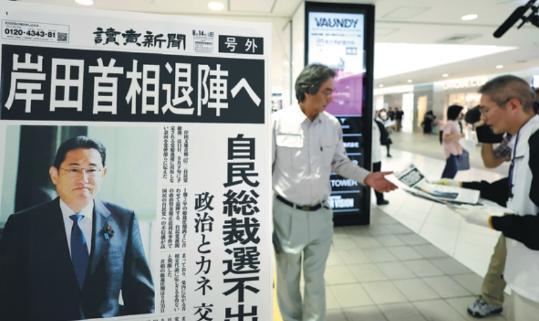Kishida to step down amid public distrust
Decision ends 3-year term marred by LDP scandals, paves way for new PM
Japanese Prime Minister Fumio Kishida, who is also the president of the ruling Liberal Democratic Party, announced on Wednesday he does not intend to run in the party's leadership election next month.
As public distrust of the LDP is rising because of a political fundraising scandal involving the party's factions, Kishida, 67, decided that he could no longer ignore the growing calls within the party for a change in leadership. He said he would step down at the end of his three-year term as LDP president next month.
At a news conference, Kishida said it is important to demonstrate to the public that the LDP will change, indicating that his decision would serve as a clear signal of the party's intent to reform itself.
His term as LDP president lasts until Sept 30, and the party's rules stipulate that the leadership election to choose his successor will take place between Sept 20 and Sept 29.
With the House of Representatives' term set to expire by Oct 30 next year, the LDP election will also serve as a way to select the "face of the party" for the next general election, The Yomiuri Shimbun reported.
The reason for Kishida's decision to step down is simply because of a lack of public support, said Ukeru Magosaki, co-representative of the Association for Inheriting and Propagating the Murayama Statement, a civic group dedicated to upholding the 1995 statement that admits Japan's wartime mistakes.
Public support for Kishida's cabinet was 19.4 percent this month — below 20 percent for the ninth straight month, though the figure rebounded slightly from last month. The latest cabinet disapproval rating was 53.6 percent, according to an opinion poll published by Jiji Press last week.
"The starting point for the loss of support was the political funding scandal involving factions within the LDP," said Magosaki, who is also a former senior official with Japan's Ministry of Foreign Affairs.
"There was no prospect of the approval rating improving, and if things continue as they are, there is even a possibility that the LDP could lose in the House of Representatives election."
Kazuyuki Hamada, an international political economist and former member of the House of Councillors, attributed Kishida's decision to step down to his lack of leadership.
"As symbolized by the issues of politics and money, the LDP's response of covering up problems has led to public disappointment. With the Kishida administration's approval rating falling below 20 percent, there is little chance of winning the upcoming House of Councillors and House of Representatives elections under the current conditions. The administration could not withstand the calls for resignation from both inside and outside the party," Hamada said.
Kumiko Haba, a professor of international politics at Aoyama Gakuin University in Tokyo, said, "Like (United States President) Joe Biden passing the baton to (Vice-President) Kamala Harris ... Kishida may have thought that stepping down himself could present a new image of the LDP."
Leadership race
Kishida's announcement is likely to intensify the LDP leadership race, experts said.
Among current party executives and cabinet ministers who support Kishida, LDP Secretary-General Toshimitsu Motegi, Minister for Digital Transformation Taro Kono and Minister in charge of Economic Security Sanae Takaichi have expressed interest in running for the post, as has Shigeru Ishiba, a former LDP secretary-general.
Other potential candidates include former minister for internal affairs and communications Seiko Noda, former environment minister Shinjiro Koizumi, former minister in charge of economic security Takayuki Kobayashi and Foreign Minister Yoko Kamikawa, experts said.
"The possibility of generational change and the emergence of a female party leader or prime minister is now a real consideration," Hamada said. "The issue will be whether the candidates can address public dissatisfaction and mistrust with innovative and creative policies that offer hope for the future."
The LDP seems to be not fully prepared for Kishida's decision, Haba said, so there may be some initial turmoil within the party. However, if his decision leads to a smooth transition in leadership and policy changes, Kishida might have thought that it could help quell public criticism of the LDP and lay the groundwork for the party's continued governance, Haba said.

